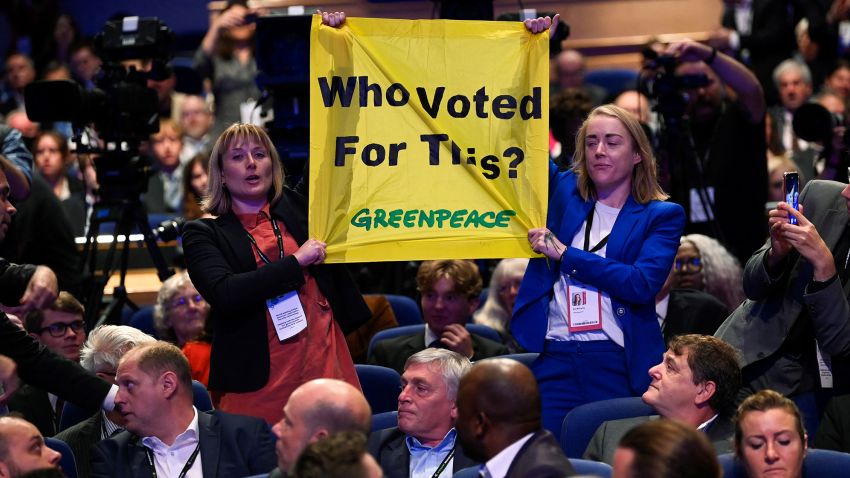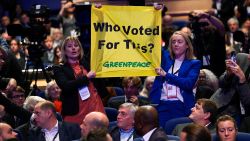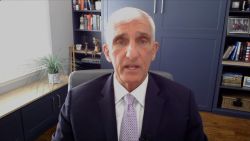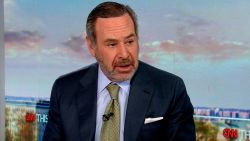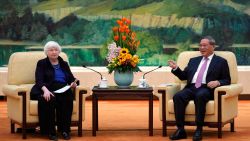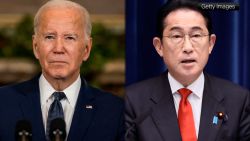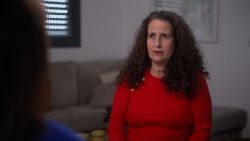The empty chairs all around the hall for Liz Truss’s debut party conference speech as Conservative leader said a lot about the chaotic past four days. The atmosphere of gloom that has shrouded the International Conference Centre in Birmingham since Sunday suggests that the party, in power in various guises since 2010, has given up the political will to live.
Most prime ministers could expect to play to a standing-room-only crowd at what would ordinarily be the biggest of big-ticket events at their own party’s annual jamboree. Allies of Truss could blame a strike by train drivers that gave conference-goers an excuse to leave a day early. But the truth is that the mood here started off flat on Sunday and resembled a wake by Wednesday. It’s hard to imagine that only a month ago to the day, Truss’ party had overwhelmingly backed her over rival Rishi Sunak to succeed Boris Johnson as their leader.
That feels like another age. Partly that’s because Britain’s revered monarch, Queen Elizabeth II, died two days after Truss took over. But more importantly, Truss’ first big policy move – a huge tax-cutting plan funded largely by borrowing, caused turmoil on British financial markets and panic in the party ranks. The parliamentary party – which has always been cooler on her than the wider membership – arrived in Birmingham to be greeted by a late-night U-turn on Sunday that did little to reassure them that the tiller was in the grip of a steady hand.
By Wednesday, the task for Truss was to deliver the speech of her life. She began – unusually for her – on a deeply personal note, speaking of growing up in Leeds, in the north of England, where she saw “too many children being let down” because of officials being too interested in political correctness.
Addressing the chaos of the past few days, Truss defended her rapid economic policies that led to the pound tanking by saying that she wanted to get on with her agenda of growing the economy from her first day in Downing Street.
Truss acknowledged her U-turn on cutting tax, but doubled down on the rest of her libertarian agenda. She told delegates that her government “will keep an iron grip on the nation’s finances,” and that she believes “in sound money and a lean state.”
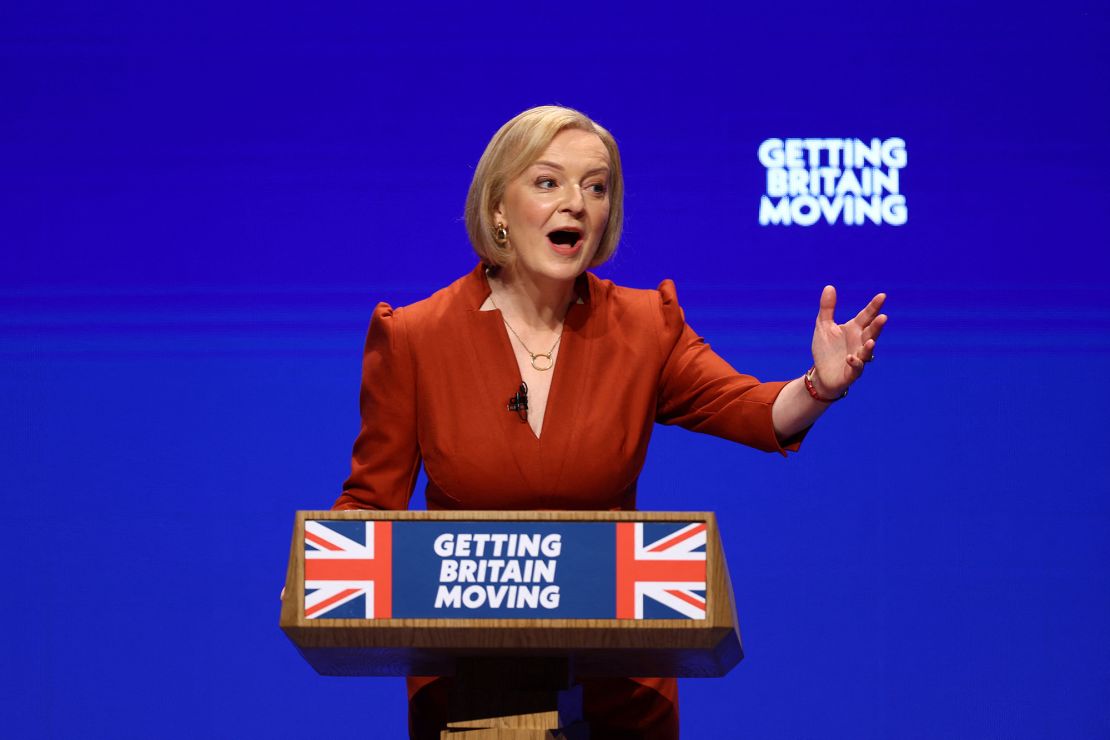
The strongest cheers came for a section on Ukraine – where her declaration that President Volodymyr Zelensky would prevail over Russia was the one thing that everyone in the audience could agree on.
But many of the other applause lines fell flat. And her boast that she was the first British prime minister to be a product of a state-funded comprehensive school rather than a private school was just not true – that particular first belongs to a Labour prime minister, Gordon Brown, who has been vocal in the past few days about what he regards as the economic illiteracy of her fiscal policies.
It says a lot that the most striking moment was the interruption by Greenpeace protesters, who were quickly ejected.
For the Prime Minister’ doubters, who think she is battling on with policies that will lead them to electoral disaster, there was little to reassure them. She ended on her core message – “we have no alternative” – but the trouble is, her critics in the party simply don’t agree.
By the eve of Truss’s speech, only those most loyal to her were trying to argue that her fledgling premiership was anything other than doomed. One cabinet minister told CNN: “It’s the end of an era. We’ve been in power for 12 years and we have no fight left.”
Advisers, supporters and even cooperate lobbyists who work for companies traditionally aligned with Conservative values were privately saying that the fight was over. Normally at events such as these, the Tuesday night is a celebration for the party of government, a place to plot new ways to punish the official opposition and indulge in the arrogance of power.
Instead, drinks receptions were half full or canceled. One lobbyist who represents a firm historically supportive of the Conservative Party told CNN that their boss had requested a refund for the event they’d thrown because the ministers who had attended were so distracted it was wasn’t worth the several thousand pounds they’d played for an audience with a senior member of the government.
How it came to this
It’s worth reflecting on what this period in power has been like for the Conservative party. Dislodged by Tony Blair’s New Labour in 1997 it has been through so many transformations it’s hard to imagine what any revitalized version of the party could look like.
After three crushing election defeats to Blair, the Conservatives elected a new leader in 2010. David Cameron was a liberal Conservative who sought to make his party the destination for aspirational centrists.
He won the general election of that year against Brown, but without an overall majority and was forced to govern in coalition with the centrist Liberal Democrat party. In tandem, the two parties pushed through policies previously unimaginable to Conservatives like legalizing same-sex marriage.
As the official opposition Labour Party failed to challenge Cameron’s Conservatives, a new threat emerged on the right: the Euroskeptic UK Independence Party, fronted by arguably the most famous Brexiteer, Nigel Farage.
Cameron dealt with the Euroskeptic surge by putting Euroskeptic policies in his manifesto for the 2015 election: Namely, promising a vote on leaving the European Union.
When Cameron won a majority in 2015 and was forced to make good on his commitment to a referendum, he supported remaining in the EU. It was a gamble that cost him his career. Barely a year after he’d secured the first Conservative majority since 1992, the crushing defeat in the Brexit referendum forced him to quit.
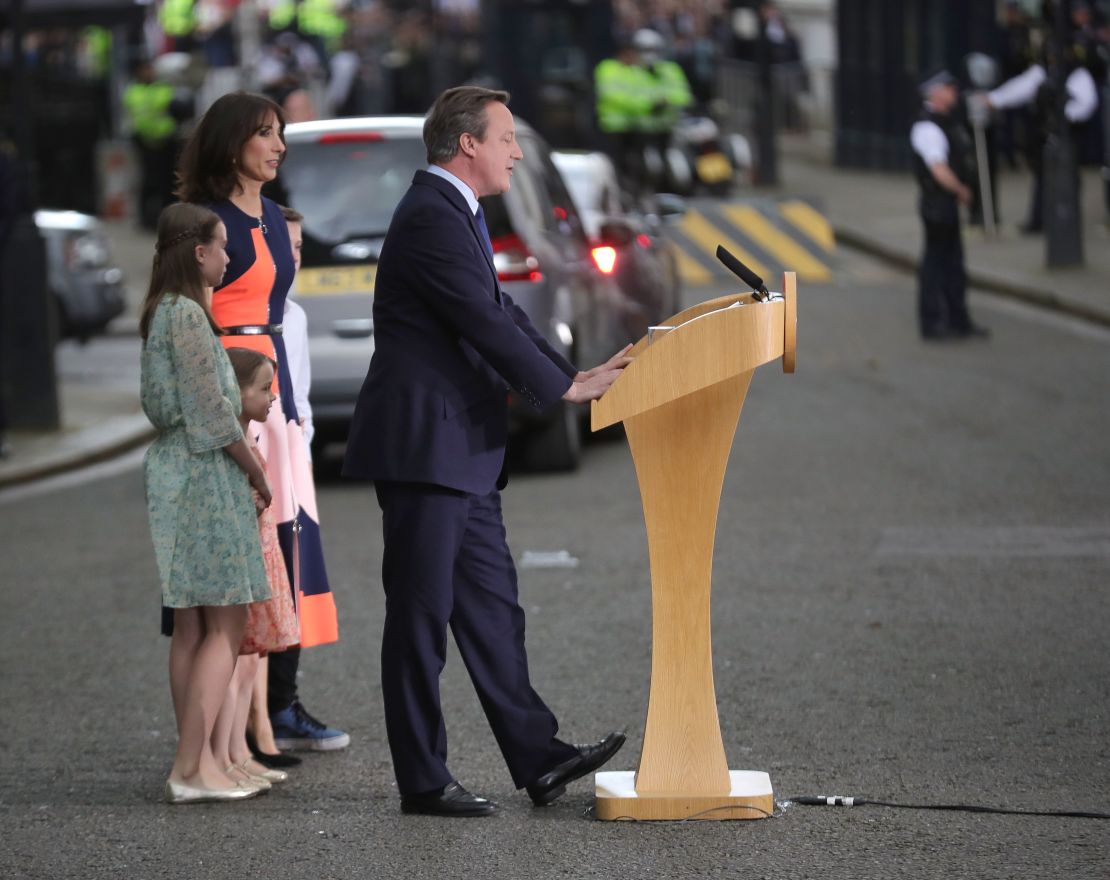
Since then, the Conservative party has rattled through every conceivable ideology and burned through so many different teams that it’s hard to see what new ideas it can possibly offer. The talent pool has narrowed, experienced party figures have been excluded, and now, Truss’s team is drawn from inexperienced ingenues and idiosyncratic think-tanks.
Truss thought the way to kickstart growth and put the Conservatives back on the front foot was to embrace a return to free-market Conservatism.
The sad truth, for Truss, is that the political will simply hasn’t been there for her ideas. The free market didn’t respond to tax cuts in the way she’d imagined and instead pulled the pound to its lowest level in decades. The recovery to parity has only been possible because the Bank of England threw £65 billion ($75 billion) at the problem. High-minded economic ideas require public consent, and Truss moved before she had secured it.
The chaos that ensued has fueled the sense that hers is a government doomed to fail.
Beginning of the end?
That doesn’t mean that defeat is inevitable. There is still a long way to go before the next general election, which will probably take place at some point in 2024. It is possible that in the coming months, the economy will pick up and people will forget about the disastrous start to her premiership.
But with open revolt in her own party and the real possibility of a leadership challenge, it’s hard to see how Truss and her government can credibly claim that the UK is a stable investment destination.
Of course, much can change and the opposition Labour Party is not measuring curtains in Downing Street just yet.
But the past few days here in Birmingham have felt like the beginning of the end.
MPs and ministers have avoided journalists and delegates. Loyalists that CNN spoke with who attempted to defend Truss at private receptions would lose their train of thought before giving up or resort to frustrated yelling. Officials working for the party were often spotted gathered in small huddles looking visibly shaken and irritable.
What happens next isn’t immediately clear. If Truss’s poll ratings continue to sink, MPs might decide getting rid of her is the only serious option, however painful doing so might be. Truss could decide to call a snap election and force solidarity from her party. Realistically, the most likely outcome is that they will struggle on and hope for the best.
Whichever path Truss takes, one thing is certain: She doesn’t have long to clean up this mess of her own making.

